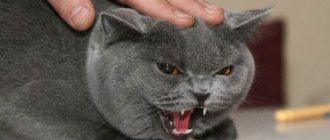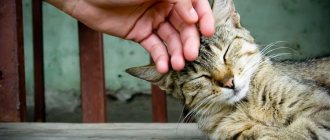In this article, I will explain the 4 main reasons why cats bite us and how to stop this behavior.
4 main reasons why cats bite:
They are injured or in pain
(most obvious reason)
If your cat suddenly shows aggression in a way that it hasn't before, it could be a sign that it is injured or sick. Take your cat to the vet as soon as possible.
Fear
A frightened cat may become aggressive. Your cat is trying to protect itself without intentionally trying to harm the person. Once you eliminate the cause of the fear, your cat should calm down and return to normal.
Redirected aggression
Some cats become excited when they see or smell a strange cat close to the apartment or house where they live. Their territorial instinct is automatically triggered - to attack. But since the cat cannot attack someone who encroaches on its territory, the attack is redirected to the nearest available target, that is, to you.
Remember, this does not happen because the cat wants to harm you, it’s just that the reaction is triggered automatically, and the attack (in accordance with the program laid down by nature in the cat’s brain) must have a specific purpose.
The best way to solve this problem is to find the cause and fix it. If your cat consistently reacts this way to outdoor cats, simply block her view by closing curtains or drapes, or keep your cat away from a window where she can see annoying animals.
You can also purchase a special spray that smells similar to “friendly” cat pheromones and works wonders to calm an agitated and stressed cat.
Biting during play
Step 1:
What you should do first is to teach your cat to only play with toys and not with your hands and feet. If you have a kitten, never
Do not use your hands or feet to play with him - use only special toys for this, this way the kitten will never think that a hand is a good object for biting.
Also, and this is very important, you must be sure that no one else is playing with your cat using their fingers. (This is very common, I know that most people like to tease a kitten by wiggling their fingers in front of his nose. Never let anyone do this because it teaches your cat that fingers are a toy too). Follow the rules strictly:
When playing with a cat, always use a special toy in the form of a fishing rod, and keep your fingers away from the animal. By using toys, you stimulate and satisfy your cat's innate hunting instinct.
Plus, it completely breaks the association in the cat's brain between your hands and play.
Stimulate your cat's hunting instinct by quickly moving the toy around the floor, hiding it behind corners, boxes, etc.
Allow the cat to chase the toy, and when the animal begins to move more slowly and show fatigue, allow the final victory and catch the prey.
Then give the kitten a protein-rich treat (following this plan satisfies the cat's natural instincts: hunting - play, eating - post-play treat, grooming and sleeping).
Step 2:
If a cat bites you, freeze immediately, do not remove your hand, because This behavior is typical of prey that is trying to break free and run away, and a reflex response is activated in the cat’s brain that it needs to bite even harder.
To get your cat to release his grip, you must move your hand in the opposite direction - towards the mouth. Since the game never moves towards the predator, this causes confusion in the cat and causes it to let go of your hand.
Step 3:
Now you must teach your cat that biting people is no fun.
This will require preliminary preparation.
Find something that makes a very loud sound that you can keep with you. I use an aluminum can filled with pebbles or metal coins (cover the hole with tape).
Another effective option is a sharp tap on the wall with a slipper.
Finally, you can simply shout out loud "Ouch!" the second the cat bites you (this should sound natural).
You can try making the sound that small kittens or puppies make when bitten by their littermates. The louder and more plaintive your cry is, the better.
Step 4:
The next time you plan to pet your cat (or do something that typically triggers biting), be prepared.
Watch the kitten, and as soon as he comes close to bite you (or does bite), shake the jar as hard as you can (or scream, if you prefer).
The goal is to create an association in the cat between biting you and a loud, scary sound.
The noise will scare the kitten, interrupt the biting and create negative motivation for this behavior.
Your cat loves you and doesn't want to hurt you, and she doesn't like scary loud noises at all.
Sooner or later, the cat will understand that it is the biting that causes the loud, scary sound, and the bad behavior will stop.
It is very unpleasant when a beloved pet responds with aggression to the manifestation of love, care and affection from its owner. But what is the reason for this behavior? We will talk about this and why a cat bites when you pet it on the website Koshechka.ru.
Why does a cat bite when you pet it?
Among the reasons, several main ones can be identified: health, character and chance. I would also like to note that below we will describe only situations, events and things that most often become the culprits of such cat behavior. Therefore, it is possible that in your case the reason may lie in something completely different. For more complete information, you can talk to your veterinarian and animal behavior specialists.
Changes in the animal's condition and various health problems can be a source of aggression. But there is one important feature here: if the cat began to bite and scratch when stroking relatively recently. For example, since childhood, the cat was gentle and affectionate, but at some point she began to show aggression. This may occur as a result of the animal experiencing pain when the hand is pressed. But again, here you need to be very careful. After all, many diseases, in addition to aggression, are accompanied by apathy, drowsiness or insomnia, poor appetite and irritability. Most often, such diseases are associated with internal organs, muscle tissue and bones. Therefore, if a cat does not allow itself to be petted, bites and at the same time does not look very healthy, then it is best to consult a veterinarian. In addition, discomfort in the animal can be caused by certain skin diseases. For example, dandruff or dermatitis, just wounds on some areas of the skin that are simply invisible due to thick hair. Also, the animal may scratch and bite when stroked due to pregnancy. The fact is that some cats, due to an interesting situation, change their character dramatically and often experience mood swings.
If a cat sometimes bites when you pet it, then the culprit may be the animal's resentment or dissatisfaction. This way the animal shows that something is wrong. She may have many reasons for this. For example, some very picky animals may react this way to a recent punishment for torn wallpaper or an overturned flower. You forgot to think, but she remembers how she got for it.
If we are talking about character, then how to wean a cat from biting when you pet it, you need to think about it almost from birth. After all, this behavior often manifests itself in childhood. Therefore, every time during play, when the kitten starts to bite, you should tell him “no!” or shush him. You can also try to distract the animal. The main thing is not to distract him with a treat, so as not to develop a bad reflex. If we are talking about an adult animal, then the same methods can be used to influence it. The main thing is to be patient. After all, this will take a lot of time, since no one stopped the animal from the very beginning. Therefore, at first you need to carry out stroking in doses: briefly, lightly touching his head or back. Over time, when you begin to notice that the animal is not going to attack you, and this can be easily determined by twitching of the ears or a sharp flick of the tail from side to side, you can increase the time of affection.
conclusions
Watch your pets and take care of them! Their behavior can tell you a lot.
Natalie Thai, Thai Cat Club
Some cats are completely submissive and allow themselves to be petted as much as they want, as long as their owners are generous with affection. Others, when they get tired of it, begin to break free from their hands, jump off their master’s lap and run away.
But there is another type of cat behavior, and there are many more of these cats than most people believe - they react to what they consider to be excessive affection with aggression: they scratch and bite. The attack is unexpected and completely inexplicable and leaves the owner not only with bleeding wounds, but also deep bewilderment in the soul.
Animal behaviorists even gave this phenomenon a name - petting-induced aggression / overpetting aggression (excessive affection).
If your cat occasionally bites when you pet it
In addition to the above, the animal may bite periodically. This behavior can be provoked by a certain situation or action. For example, you played with your dog, and after a while you decided to pet your cat. Cats are very sensitive to smells. Therefore, it is likely that she will begin to get angry when she smells a foreign smell on her fur coat. And it may not even be the smell of a dog. Any foreign smell can cause aggression. For example, the smell of your friend's cat, who rubbed against you and sat on your lap when you were visiting her. The same reaction can be provoked by any unpleasant odor for the animal. For example, the scent of perfume, hand cream or herbal hair mask.
Also, the cat simply may not like long strokes in one place. She begins to get irritated and with her bites she simply shows you that she has had enough of affection and tenderness. Therefore, if a cat bites when you pet it for a long time, then you should not wean it off, much less punish it. You just shouldn't delay this process. Correction of the animal's behavior is only necessary if the animal is aggressive with the first stretch of hand. In addition, the animal can bite if it is stroked in certain places. For example, at the base of the tail or behind the tail itself, behind the tummy. For some cats, the head and chin are the only areas that are “acceptable” for petting. The rest of the body causes only a negative reaction.
We hope that the site helped you figure out the reason why your cat bites and scratches when you pet it. And don’t forget that cats are capable of experiencing emotions similar to humans, so you shouldn’t immediately start correcting behavior. Try to first identify the cause and eliminate it.
A cat, like a person, has emotions; it can be angry, happy, trust, love and hate. And she conveys her feelings by purring, facial expressions, meowing or actions. But it's not always clear to humans what's on a furry friend's mind when he behaves differently. For example, it is not clear to the owner why the cat bites when you pet it, because, in his opinion, it should experience only positive emotions during petting.
Theories explaining affection-induced aggression
There are many theories trying to explain cats' aggressive behavior in response to affection. Let's look at a few of them.
Incorrect socialization
. Cats should be socialized to people from a very early age. Cats that interacted with a person for at least 5 minutes a day before 7 weeks of age will be much more affectionate and trusting than animals that did not meet a person at this age. But this theory does not explain why properly socialized cats sometimes become aggressive towards their owners.
Sensitivity threshold.
According to this theory, cats initially enjoy being petted by people, but then become irritated by it. And when a cat bites or scratches its owner, it is as if it is trying to say “enough is enough.” Here we can draw an analogy with human behavior. Imagine that someone strokes your back in the same place with the same pressure for a long time. At first you like it, but then it begins to cause discomfort and even pain, and you want to move away from that person or ask him to stop.
Pain
. There is a theory that constant petting not only causes irritation in animals, but also physical pain, since the static electricity generated when stroking an animal's fur has a negative effect on its nervous system.
If your cat is in pain and you pet him in that particular area, this can also cause aggressive behavior.
Sharp awakening.
The cat may enjoy the affection and almost fall asleep (although its eyes may remain open). If she suddenly wakes up, she may not realize that you are just petting her, and she may think that you are trying to grab her. Then she will instinctively bite you and run away before she realizes what is happening.
Control
. According to this theory, aggressive behavior is explained by the fact that the cat always strives to maintain control over the situation - when to start stroking it, when to stop, it decides for itself. The cat thus emphasizes its dominant position.
Take your pet to the vet.
It is important to find out if he has any disease that could cause pain. For example, arthritis in the neck, hind or hip joints, sore teeth, ear infections, etc. can cause pain in cats. Stroking the cat may make this pain worse, or the cat may become nervous in fear that you will touch the painful area.
Understand and accept that not all cats like “calf tenderness.”
Each animal is individual. Some people like to communicate with a person, climb into their arms, and endlessly caress them. Others just like to be close to the person, nearby, but they do not need closer contact. You can't change your cat's personality. Accept her for who she is.
Be careful and study your cat's body language!
Perhaps your cat is in the mood to play right now, and not at all to cuddle. In this case, it is better to throw the ball to her. See the article "" and "" for more details.
Here are some warning signs
:
- The cat stopped purring.
- Twitching of the tail.
- Exasperated tail wagging.
- Twitching of the hair on the back after stroking.
- Change of body position.
- Body tension.
- Ears are pressed to the head.
- Dilated pupils.
- Meow.
- Growl.
If you notice any of these signs, stop all your movements and release the cat.
For more information about cat body language, see the article “”.
Forecasting
. If you know that your cat is prone to this type of aggression, then it would be a good idea to time the time during which the cat enjoys your affection. If, for example, your cat shows signs of irritation a couple of minutes after you start petting her, then never pet her for more than a minute and a half (while still watching for warning signs).
Pet your cat the way she likes.
Some cats prefer short, jerky stroking movements, as if another cat is licking their fur. Others like to be scratched under the chin or behind the ear. Still others prefer to be stroked only on the head, to the exclusion of the rest of the body. Some people like to have their tail ironed, but others don’t. Consider your cat's personality preferences.
Sometimes a special contact is established between a cat and a person. For example, a cat may be delighted when one of the family members scratches its chin, but only allows another to stroke it all over its body, and not vice versa. Probably the most striking example is when a cat allows one person to stroke its belly, but not another. Respect your cat's interests and wishes!
Look for options for your individual contact with your pet that will be pleasant for both of you!
Never punish a cat for this, as this can cause even more aggression.
Use training
. If your cat doesn't bite when you pet her, give her a treat, such as a small piece of chicken or another favorite treat. Repeat this action several times a day, stroking the animal little by little, without crossing the threshold of sensitivity. (Stop as soon as you notice signs of irritation.) After a while, the cat will understand that affection is something pleasant, as it is followed by a treat.
The most important advice is to love your cat.
. Even if she bit you or scratched you. Don't take out your irritation or anger on her. Study information on cat behavior and apply it in your life. Be happy with your cat!
Cat owners know firsthand how quickly the behavior and mood of their beloved pet can change. An affectionate and gentle cat can rub its head against a person’s hand, purr and show its positive attitude in every possible way, but after a minute a good-natured animal can turn into a real predator who, for no apparent reason, attacks its owner. Most people are puzzled why a cat bites when you pet it, but there are many reasons for this behavior, each of which has its own explanation.
Are pets that simple?
Cats are amazing animals that have been close to humans since ancient times. Cats were not tamed like dogs, they were not put in cages like parrots and canaries, they themselves came to a person and settled in his house.
In ancient Egypt and Mesopotamia, a furry predator went for prey in a grain storage facility, where there were many rodents, and that is where it met people. Over time, the person became attached to this animal and was able to study the psychology of cats. The main “sensors” of a cat’s emotions and feelings are their tail and ears, and then only their postures, facial expressions and gestures.
- Ever notice how two cats rear up before a fight?
- The cat defends itself with hissing, raised fur, and an arched pose.
- If a cat continually rubs against his legs, not allowing passage, he clearly lacks attention and affection.
- A plaintive meow can be a signal of some health problems, or a request to eat or drink.
Cats, by the way, are not without cunning and resourcefulness. For example, if during an illness the cat received more attention and affection, then he may realize and begin to pretend to be sick.
Why does an animal bite and scratch?
Another way to convey your emotions and desires is to bite and scratch. This behavior is not always explainable to a person, and sometimes it seems to him that the cat bites for no reason, just like that.
But this is not so, such behavior always has a reason:
- It is not uncommon for an owner to give his pet a good beating for stealing a piece of sausage from the table: teach him a lesson with a broom or slipper, spank him with a towel, or throw him out into the street with a kick in the tail in the bitter cold of winter. Because, having received what he deserved, the cat will remember and will no longer misbehave. The cat will really remember and……. will take revenge. Therefore, when the owner has forgiven his fluffy cat and again tries to bestow affection on him, he may remember the offense;
- Sometimes the cat really wants to do something, but the owner doesn’t allow it. And then he shows stubbornness, biting and scratching;
- A kitten, like a child, can bite when it is teething;
- Cats often bite their kittens to show them their love. Such bites are weak and painless. If a cat slightly bites your hands, she is showing her love;
- Cats are predators by nature, but in a cozy human home there is always food, water and a warm sofa. Only the instincts still make themselves felt, and the energy requires an outlet. And then the cat plays, runs after a ray of sunlight and bites;
- During illness, a cat, like a person, can hardly enjoy any kind of affection; he just wants peace and relaxation.
Why do cats lick their owner?
Bites and scratches from a cat are not entirely pleasing to the owners; it is much more pleasant if the cat licks them. But she also doesn’t just give out her “cat’s affections”:
- The first explanation for a cat licking a person is that it is expressing its love and gratitude;
- Have you ever wondered where the expression “suck up” came from? Most likely, precisely from observations of that. How cats beg for something from their owners: they literally lick their hands and face, and all this with one goal - to extract a tasty treat or get permission to take a walk;
- Cats have a developed maternal instinct and they always lick their kittens to keep them clean. In the same way, they can take care of their owner.
In this video, a large black cat, a panther, gratefully licks its owner:
Why do cats lick and then bite?
But there are situations when a cat first shows affection, licks the owner, and then begins to bite. How to evaluate such strange behavior?
Animal psychologists explain the sudden change as follows:
- Cats are quite freedom-loving animals, they still have the instincts of a hunter and a savage, so constant affection can be a burden for him. Yes, they love care and attention, but only in moderation and according to their mood;
- Or it may be that at first the stroking was pleasant, but then it got boring, but the annoying owner doesn’t stop doing it, and then she bites, trying to explain that that’s enough for today;
- This behavior may arise due to a negative experience when, after a pleasant stroking, she was hurt or unpleasant. For example, they lured him in to give him a bath or give him an injection. So, the cat relaxes at first, but then realizes that caresses are deceptive and tries to defend itself.
How to stop a cat from biting and scratching?
Biting, regardless of the reason, can develop into a habit and then the cat needs to be re-educated
.
- Firstly, do not teach them to play with their hands and do not allow them to be bitten.
- Secondly, if a cat really wants to bite and play, then let him use special toys for this purpose, not the hands and feet of people.
- Third, show your cat that hands are not suitable for play. When she starts biting, do not pull your finger back sharply, first freeze, and then, on the contrary, move your hand towards the cat. If you suddenly remove your hand, the cat will associate its movements with the behavior of the prey, and this will fuel its excitement.
- Fourth, the cat must know that biting is bad. Every time your furry friend bites you, make a sharp sound, such as slamming a slipper on the wall or slamming your hand on the table. Loud sounds are unpleasant for a cat's hearing and therefore the next time, before biting, the cat will remember the unpleasant consequences.
Of course, you can stop a cat from biting if you have patience and know how to do it correctly, but only if this behavior has already become a habit and is purely reflexive. But if the cat did not behave this way before and always loved affection from humans, then you first need to find out why the cat bites when you pet it. Maybe she's scared or sick? Or maybe you shouldn’t be so intrusive and leave your pet alone.
Video about the behavior of furry predators
Lovers of domestic cats value these graceful fluffy creatures primarily for their ability to create a unique atmosphere of comfort and warmth in the house. However, not all pets are capable of being affectionate and giving owners peace. Often they show aggression. There are many reasons why a cat bites when you pet it. Having understood them, the owner will be able to correct the behavior of the furry aggressor, and mutual understanding and a friendly atmosphere will reign in the house.
A cat is not a stuffed animal
What does everyone know about cats? They are the second pets chosen by families, they are carnivores and love each in their own way. It is for this reason that we must respect a cat, because it is not a stuffed toy or a puppy who loves nothing more than to cuddle. Additionally, you must remember that a cat has self-control: it is he who decides who, when and how to deal with, so forcing him to interact is only counterproductive.
© shutterstock
For cats, our home is their home, and they are the ones who allow people to live in it. When they rub against you, they are marking territory so it's clear who's in charge. For humans, this is an affectionate gesture, but it is a special affection, different from how we humans understand it. For this reason, when it comes to petting and/or touching, the cat will decide and communicate its feelings through body language.
Causes of bites
Experienced breeders know that a healthy and well-trained animal will never show aggression towards a person out of the blue. Inappropriate behavior of a pet is usually associated with health problems, disorders of psycho-emotional development, as well as errors made during upbringing.
| Reasons why a cat bites when you pet him | Rationale |
| Negative past experiences | Sometimes an animal is lured by affection into procedures that are unpleasant for it: bathing, claw trimming, injections, etc. It is enough to deceive your pet several times in such a treacherous manner from the cat’s point of view - and trust will be lost forever. Subsequently, the display of affection and attention from members of the household will be regarded by the animal as a manifestation of violent actions towards it. Of course, the response will be biting and scratching. |
| Early weaning of a kitten from its mother | A mother cat, as a rule, teaches the baby that a person is a source of food, warmth and does not pose a threat. If weaned early, the kitten does not have the appropriate experience of communicating with people; a large creature causes fear in it and, as a result, aggression. The owner’s hands frighten the mature animal and, defending itself from an imaginary danger, the adult cat displays self-defense when they try to pet it, scratches and bites. Animals born outside in the wild behave the same way. A person is perceived by street cats as a hostile object, from which they can use claws and teeth to defend themselves. |
| Pregnancy or breastfeeding period | The reason is quite understandable - an instinctive desire to protect future offspring. Many owners notice that a pet's pregnancy dramatically changes its character, and some cats become unfriendly and wild. |
| Pain | Unpleasant sensations and pain cause attacks of aggression in the animal. Cats react especially sharply when stroking their bellies in the event of the development of diseases of the internal organs. Diseased kidneys may be the reason why a cat does not allow itself to be stroked on its lower back. Inflammatory phenomena on the skin, damage, wounds and scratches are a common reason why a cat bites hands when stroking. |
| Perception of affection as a game | Small kittens are most often mischievous due to the fact that they perceive affection and attention from humans as a game. As soon as household members start playing with the baby using devices or toys, the problem is quickly solved. |
Among the many reasons for cat aggression, the owner must understand which factor is the trigger in a particular case.
Cat character
Like any other animal, each cat has its own personality, determined by genetics and the environment in which it was raised.
There are very sociable cats who are always ready for communication and affection, and others who tend to look at everyone with distrust from afar. This type of behavior is usually associated with a difficult or traumatic past experience, especially if it is a stray cat. In any case, however, you should know that this type of shy and elusive personality can also characterize a cat that has always lived with people.
Trying to teach your cat to be touched can exacerbate any issues with mistrust or reticence, to which the cat will react by running under the bed or somewhere else to hide and prevent being touched.
Theories about the preconditions for aggressive behavior
To explain the causes of inappropriate behavior, animal psychologists adhere to the theory of overpetting aggression. This term is applied to aggressive behavior of an animal caused by excessive affection. Unfortunately, the opinion that all cats love to be petted and show attention to their person is wrong.
It often happens that at first the pet tolerates stroking and caressing. This creates the illusion that the animal likes this attitude. However, an experienced breeder and cat breeder, observing how the cat’s body tenses and begins to move its ears, will immediately guess that the pet is uncomfortable with affection. An inexperienced person will miss these signals, or even begin to stroke the dissatisfied animal with even greater zeal.
Further caresses usually lead to the pet biting and scratching the owner. Overpetting aggression is a poorly understood phenomenon. Experts believe that this behavior is typical for unsocialized animals, as well as for individuals with a high sensitivity threshold. Such a reaction is often caused by a sudden awakening of the pet, when the cat is not able to assess in the first fractions of a second the danger of the actions being taken against it.
How to recognize aggression?
To protect yourself from a sudden attack by your beloved pet, a person must be able to recognize the slightest changes in the cat’s behavior. The following signs indicate that the animal is about to attack the owner and cause him pain:
- the cat suddenly tenses up and freezes in one position, and stops purring;
- the animal begins to turn its head and look in different directions;
- the pet presses its ears back and vigorously waves its tail;
- the cat’s pupils begin to dilate, and the fur on its back twitches nervously;
- the animal may begin to growl.
Why does he bite after licking?
Many owners are perplexed when a cat purrs, caresses, and then suddenly shows aggression. The reason why a cat licks and then bites is most often an unfulfilled desire. For example, an animal, caressing it, demands to treat it with something tasty or to caress it, to pay attention to it. And for some reason a person ignores such a persistent request from an animal’s point of view.
In this situation, the pet is forced, firstly, to demand what he wants using the methods available to him, and, secondly, to throw out the negative feeling with the help of aggression due to the impossibility of its realization.
The reason why a cat purrs and bites is often due to careless handling of the furry couch potato. The owner and household members sometimes forget that cats are very sensitive to caresses in the abdominal area. This is due to the fact that the abdomen is a vital area in which the main organs are located. Damage to the abdominal cavity threatens the animal with death. Therefore, cats are especially sensitive to affection when they begin to be stroked in this place.
This instinctive behavior relates to issues of self-preservation of the feline species. It is not surprising that the owner, having forgotten about this feature of pets, will receive rebuff and be bitten or scratched.
Pain and inflammation in cats
Various diseases can also cause a pet’s aggressiveness.
If your cat loves affection, but for obvious reasons has stopped giving it, and can make sounds when you touch them, then the owner should be wary. This behavior may be a sign of poor health or illness in the animal.
. In what cases is this possible:
- the pet, but there is no vomiting - it is better for the owner to wait until the pain goes away;
- abdominal pain with abnormal feces and vomiting, lack of appetite, apathy - a sign of poisoning;
- presence of wounds, scratches on the skin;
- bruises, dislocations, ;
- blocks, ticks, lice-eaters that cause discomfort;
- and urinary system, inflammatory processes in the bladder;
- the development of pathologies in the abdominal organs of the animal.
Diagnostics
To identify a more precise reason why a cat does not allow itself to be petted, you need to monitor its behavior. In most cases, she may simply be in a bad mood, which is quite normal.
If your pet feels unwell for more than a day
, which consists of apathy, lack of appetite, poor stool, abnormal urine output, etc., then this is a good reason to conduct an examination.











